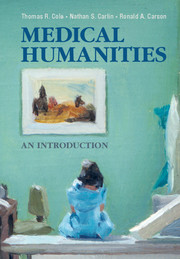Book contents
3 - Educating Doctors
from Part I - History and Medicine
Summary
To study the phenomena of disease without books is to sail an uncharted sea, while to study books without patients is not to go to sea at all.
- William OslerAbstract
This chapter explores the history of medical education in the west. Beginning with a discussion of how medical knowledge was established and transmitted in antiquity, it examines how many important medical texts were translated into Arabic in the Middle Ages; how scholars rediscovered and rethought these texts in the Renaissance; how medical education evolved during the eighteenth and nineteenth centuries to include new academic subjects such as physiology and chemistry; and how, by the middle of the twentieth century, medical education came to be associated with academic health centers. Then, with a focus on a 2010 Carnegie Foundation Report, it considers some of the challenges facing medical education in the twenty-first century.
INTRODUCTION
As all teachers and students know, education is a difficult business. Medical education is especially difficult because people’s lives are at stake and because the acquisition of scientific and clinical knowledge is such a demanding process. The history of medical education is characterized by several pedagogical tensions. Do students learn best from texts and classroom lectures or from clinical apprenticeships and experience? Should education be focused on the disease or the person? On the mastery of universal scientific knowledge or the care of unique individuals? These polarities are not mutually exclusive, of course, but finding the right balance among them is an elusive and ever-changing task. The history of medical education is also characterized more recently by a conflict between educating a privileged male minority and opening medical education to women, immigrants, and racial and ethnic minorities.
- Type
- Chapter
- Information
- Medical Humanities , pp. 57 - 73Publisher: Cambridge University PressPrint publication year: 2014



